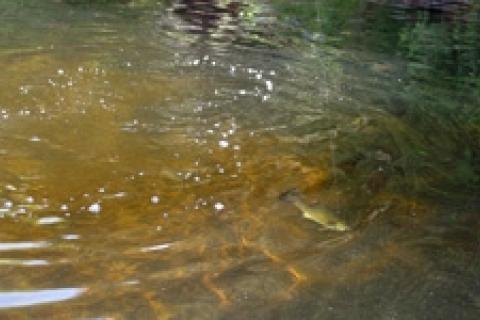
Yesterday, I went fly fishing for bass on a lake that holds a good population of largemouth and smallmouth bass. Typically, it's not too difficult to get good fly fishing action there, especially if you use deer hair topwater lures, wooly buggers and muddler minnow variants like the Zoo Cougar.
 |
| Clear, flat water made it easier for the fish to see any movements from above. |
Yesterday, however, we couldn't raise a decent fish. Worse still we watched three very respectable largemouth bass examine our offerings, turn up their noses and cruise right by. The problem, I strongly suspect, was flat, clear water.
Typically, the wind runs up and down that lake, creating an angler-friendly chop on the water. Those little waves act as a curtain between the fish and the angler, lessening the chances of them detecting exaggerated movements like casting, which spooks them. I'd like to think that the chop adds a bit of action to the fly too. And I know it provides fish with a sense of security from airborne predators and anglers alike, making them a little more reckless.
As, I said, we didn't have that advantage on that day. Because the water was not being agitated by the wind, it was exceptionally clear too, as evidenced by the fact that I watched a small bass charge about 15 feet towards my fly, only to reject it up close.
My fishing partner for the day, Will, had the same issues, so we had a little pow wow and decided that changes were needed. Will chose to go with a bright gaudy fly. His theory was to give them something different that they could see from a good distance. I chose to tie on something a bit more natural, a more realistic impression that would pass inspection close up. Both of us, used smaller flies.
Interestingly, the fish responded better to Will's approach and I soon tied on an orange fly, too. It worked, although we didn't get any bragging sized fish for the rest of the morning. Later, on the way out, we trolled with long lines behind the boat and also did much better. In this case, a black wooly bugger (imitating a leech, I suspect) did better. My theory is that it did better in the wake of the boat because it was far from us and in agitated water.
I guess we should have figured all this out sooner, but we were initially blaming everything but the conditions and our approach — mostly, a cold front that had just passed. And, as much as I'm ashamed to admit it — we underestimated the bass.
The point is that when the water gets flat and clear, an angler needs to adapt. I'm sure that longer, finer leaders ad tippets would have also helped considerably. But those things were in our trout vests.
Next time will be different — I'll be ready for these conditions too.
- 2564 views

